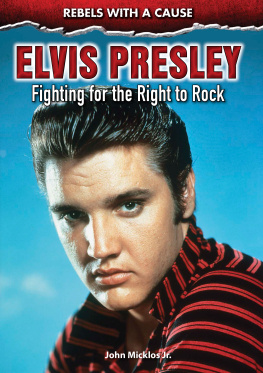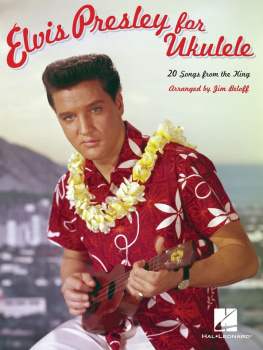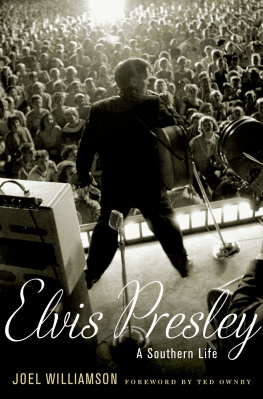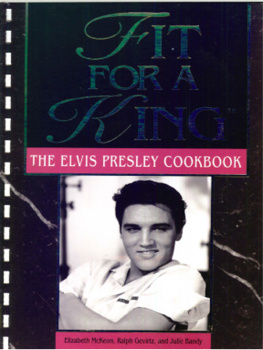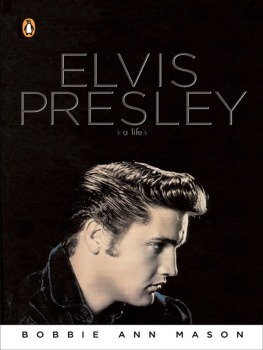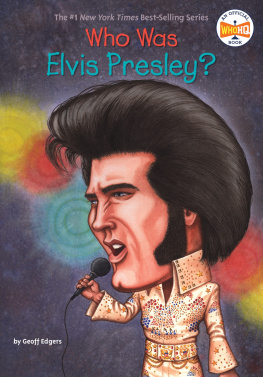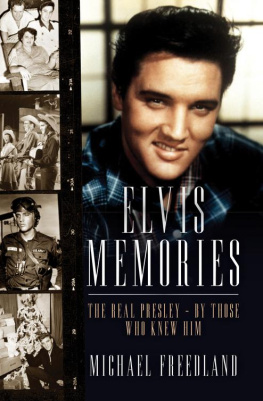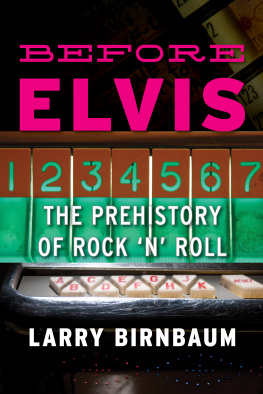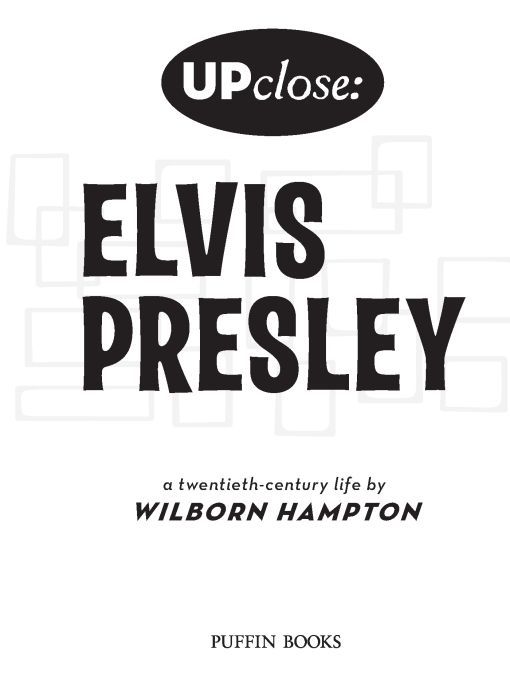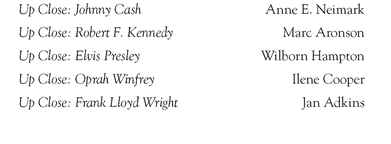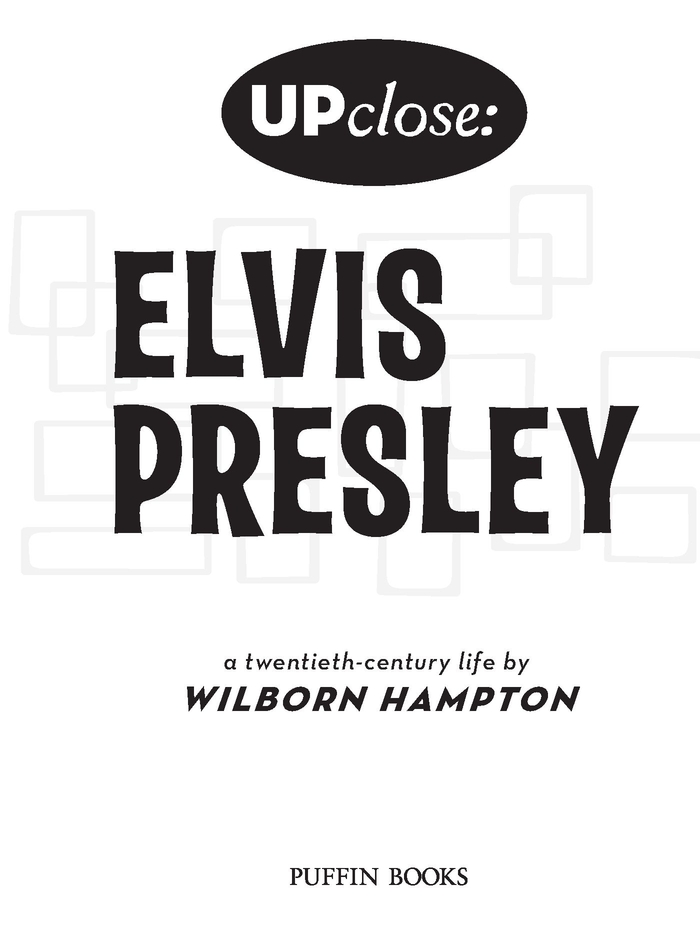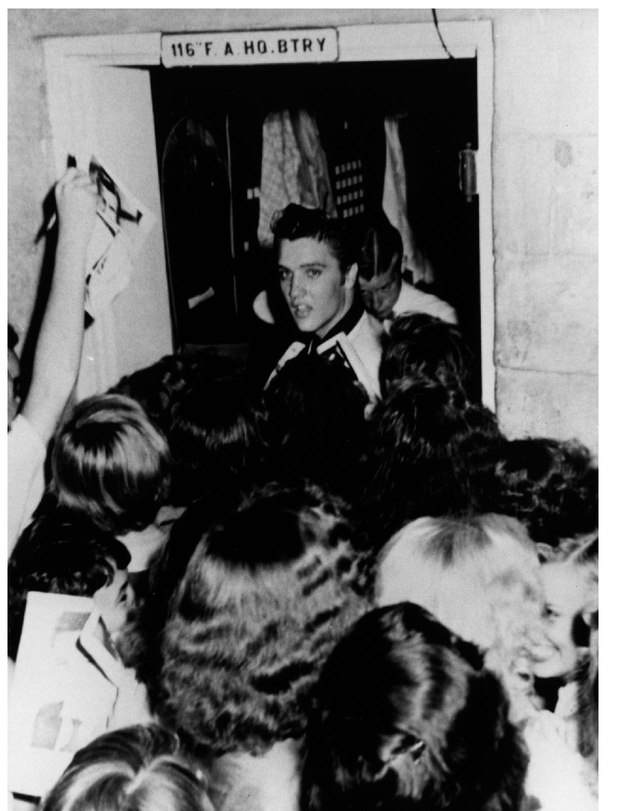Table of Contents
I DONT SOUND LIKE NOBODY.
What kind of singer are you? she asked.
I sing all kinds, Elvis said.
Who do you sound like?
I dont sound like nobody.
What do you sing? Hillbilly?
I sing hillbilly.
Well, who do you sound like in hillbilly?
I dont sound like nobody.
Finally, the studio was ready, and Elvis went in with his guitar and began to sing the main song he had come to recordMy Happiness. It was a ballad he had sung many times on the steps at the Courts, for his mom and her friends, and for the girls. For the flip side he sang Thats When Your Heartaches Begin. Years later, Elvis recalled that his guitar playing sounded like somebody beating on a bucket lid.
Marion had listened in while Elvis made his record, and from the first plaintive, quavering notes he sang, she realized he was right. He didnt sound like anybody else.
READ ALL THE BOOKS IN THE UPclose SERIES
For Douglas This was how your Dad learned to rock and roll
FOREWORD
THE FIRST TIME I heard Elvis Presley was in the fall of 1954. I was in my final year of junior high school. It was a Saturday, and I had gone roller skating with a couple of friends. We had rented our skates and were gliding around the rink to the usual dance music, checking out the girls, when a new song burst over the sound system.
It made me want to shout out loud. It was like nothing I had ever heard. I knew and liked Bill Haleys Rock Around the Clock, regarded by some as the first rock-and-roll song, but this was something else. This was a cry from the heart, a rebel yell announcing the advent of a new music. The girls were momentarily forgotten and I started trying to skate to the upbeat tempo of the song. I think I fell down. Its not easy to rock and roll on roller skates.
As soon as the song was over, I skated over to the disc jockey and asked him what the song was. It was a record he had just gotten in and he had to look at the label. He said it was called Good Rockin Tonight. Who was the singer? He looked at the label again. Elvis Presley. I asked him if he would play it again, and he did.
The next week I went to my local record store and asked for the record. The clerk seemed never to have heard of either the song or Elvis Presley. The following week I went downtown to the one record store in Dallas that might have it. It was a well-known store called the Record Mart and it was located in a section of town called Deep Elm, which in the still-segregated society of the 1950s was a predominantly black area. It was not that it was a rough part of town, but, as in Beale Street in Memphis, the famous home of the blues, the presence of a white kid could draw stares.
The Record Mart had a copy and I bought it. The clerk there told me that it was actually Presleys second record, but they were out of the first one, a song called Thats All Right, Mama, and were waiting to get a new shipment in. I took my record home and played it over and over. Elvis had a new convert to rock and roll.
Another early memory of Elvis is from a couple of years later. It was summer and several of the neighborhood kids were in the backyard of a family that had three daughters. We had a record player, and somebody put on a copy of Heartbreak Hotel, Elviss first new record for the RCA label. We all jumped up and started bopping around on the grass.
Suddenly the back door of the house next door opened. The woman who lived there, who was known as a sort of religious fanatic, stepped outside and began to scream at us: Jezebels! You should all be ashamed of yourselves. That music is evil. She went on for a few minutes.
We had stopped in our tracks when she started her tirade, and when she finally ran out of steam and went back inside, we turned the volume down and went on dancing.
Elviss story is at once both heartwarming and heartbreaking. It is the story of a poor boy from the wrong side of the tracks who became a king, an outsider who pursued his dream despite the ridicule and derision of his peers. It is also a cautionary tale of the dangers of excess and the corruption of fame.
Whether you loved him or hated him, Elvis left no one indifferent to rock and roll. And whether for good or ill, he almost single-handedly changed the musical culture not only of America but of the world. As John Lennon of the Beatles once said, Before there was Elvis, there was nothing.
At every stop on his 1955 tour, crowds of screaming fans, mostly girls, mobbed Elvis.
INTRODUCTION
IN MAY 1955, Elvis Presley was appearing as one of the acts on Colonel Thomas A. Parkers traveling country western show, playing twenty cities in three weeks. The show was headlined by top country recording artists like Hank Snow, Slim Whitman, and the Carter Sisters with Mother Maybelle.
Elvis was then a twenty-year-old singer who in less than a year had had four singles issued by Sun Records, a little-known label run by Sam Phillips in Memphis. From the first engagement, on May 1 in New Orleans, Elviss appearances had been generating a lot of excitement, especially among young girls in the audience, all of whom seemed to go into throes of ecstasy for the singer who had a habit of shaking his leg and swiveling his hips when he performed.
By the time the tour reached Florida, everybody was talking about the reception Elvis was getting from the girls, and Colonel Parkers publicist in the Sunshine State, Mae Axton, decided to interview Elvis for the tours publicity packet. As she recalled later for Peter Guralnick, Elviss biographer, she asked him about his gyrations onstage:
Mae: You know, what I cant understand is how you keep that leg shaking just at the right tempo all the time youre singing.
Elvis: Well, it gets hard sometimes. I have to stop and rest itbut it just automatically wiggles like that.
Mae: Is that it? Just automatically does it?
Elvis: Yes, maam.
The tours first stop in Florida was Daytona Beach, and Mae remembered coming across Elvis standing outside their motel and staring at the Atlantic. Elvis had never seen the ocean, and he turned to her and said: Mrs. Axton, look at that ocean. I cant believe its so big. Id give anything in the world to find enough money to bring my mother and daddy down here to see it.
Mae, who was a high school English teacher when she wasnt moonlighting for the Colonel, took an instant liking to the boy who was so shy and polite offstage and, by all accounts, so full of explosive energy onstage. That night she went to see him perform for the first time. She saw a former student in the audience with some other girls, and they were all jumping up and down and squealing. After Elvis finished, Mae went up to the girl and asked her, Honey, what is it about this kid? The girl smiled sheepishly and replied, Awww, Mrs. Axton, hes just a great big beautiful hunk of forbidden fruit.


